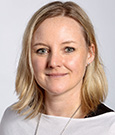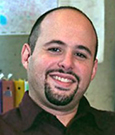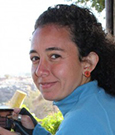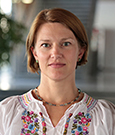
Melanie Blokesch
EPFL
Switzerland
EMBO | EMBL Symposium
EMBO and EMBL are committed to sharing research advances and sustaining scientific interaction throughout the coronavirus pandemic. We are delighted to announce that this conference is going virtual and invite you to join us online.
This symposium will cover a broad range of topics in microbiology, including antibiotic-related research, bacterial communities and microbiome, cell biology, regulation & signalling, pathogenesis and evolution. Emphasis will be placed on novel approaches and technologies (from systems-based to single-cell) that drive each field or have the potential to revolutionise future research in microbiology.
This meeting is the fifth of its kind, part of a successful series which started in 2013 and held biannually since, becoming a must-attend event for scientists working with bacteria and new technologies. The focus remains on the interface of new technologies and new biology in bacteria, but the thematic areas change and speaker line-ups do not overlap between consecutive symposia.
This symposium aims at bridging the gap between traditional microbiology and novel technologies, by exposing microbiologists to new ways of addressing their hypotheses. At the same time, it provides a platform for systems or technology experts to get a better understanding of the important questions in the field.

EPFL
Switzerland

Goethe University Frankfurt
Germany

McMaster University
Canada

New York University Langone
USA

Stanford University
USA

Princeton University
USA

University of California, San Francisco
USA

ETH Zurich
Switzerland

University College Cork
Ireland

University of Basel
Switzerland

Washington University in St. Louis
USA

Massachusetts Institute of Technology
USA

National Centre for Biotechnology
Spain

French National Centre for Scientific Research
France

Université de Lausanne
Switzerland

University of California, Berkeley
USA

Princeton University
USA

Institute of Science
Israel

Ludwig-Maximilians-Universität München
Germany

Columbia University
USA

University of Illinois
USA

Newcastle University
UK

ETH Zurich
Switzerland

EMBL Heidelberg
Germany

Institut Pasteur
France

Stanford University
USA

Massachusetts Institute of Technology
USA
Got something to say? Tweet it! #EESMicrobiology
| Time (CEST) | Speaker |
|---|---|
| 17:00-17:40 | Transition to PI position Moderator: Rachel Coulthard-Graf Panelists: – Nassos Typas – EMBL Heidelberg, Germany – Tam Mignot – French National Centre for Scientific Research, France – Carol Gross – University of California, San Francisco, USA – Zemer Gitai – Princeton University, USA |
| 17:40-17:50 | Break |
| 17:50-18:30 | Future of Scientific Events Moderator: Pascale Cossart Panelists: – Jürgen Deka – EMBL Heidelberg, Germany – Daniel Lopez – National Centre for Biotechnology, Spain – Gerlind Wallon – EMBO, Germany |
| 18:30-18:40 | Break |
| 18:40-19:20 | Scientific Publishing Moderator: KC Huang Panelists: – Andrea Du Toit – Nature Reviews Microbiology – Jingyi Hou – EMBO press – Claudio Nunes-Alves – Nature Microbiology – Nonia Pariente – PLOS – Cherilyn Sirois – Cell |
| 19:30-20:00 | Meet the editor session in individual zoom rooms – Cell Cherilyn Sirois – Cell Host & Microbe– Lakshmi Goyal – EMBO Review Comms– Sara Monaco – iScience – Sheba Agarwal-Jans – Nature Microbiology – Claudio Nunes-Alves – Nature Communications – Cesar Sanchez – Nature Protocols – Hannah Clark – PLOS Biology – Nonia Pariente & Paula Jauregui – Wiley – Marina Ostankovitch |
| Time (CEST) | Speaker |
|---|---|
| 12:45-13:00 | Opening remarks by scientific organisers |
| Virtual Session 1: Systems Biology Session chairs: Gene-Wei Li, Berenike Maier | |
| 13:00-13:25 | Biophysical proteomics for elucidating protein interactions in microbes Mikhail Savitski – EMBL Heidelberg, Germany AVAILABLE ON DEMAND AFTER LIVE STREAM |
| 13:25-13:30 | Transition (to setup and switch to the next live talk) |
| 13:30-13:45 | The proton motive force determines Escherichia coli’s robustness to extracellular pH Teuta Pilizota – University of Edinburgh, UK AVAILABLE ON DEMAND AFTER LIVE STREAM |
| 13:45-13:50 | Transition (to setup and switch to the next live talk) |
| 13:50-14:05 | Defining the specificity of RNA decay initiation in Bacillus subtilis James Taggart – Massachusetts Institute of Technology, USA AVAILABLE ON DEMAND AFTER LIVE STREAM |
| 14:05-14:25 | Break |
| 14:25-14:50 | Scaling systems level interrogation of prokaryotic biology to the needs of the microbiome era Saeed Tavazoie – Columbia University, USA |
| 14:50-14:55 | Transition (to setup and switch to the next live talk) |
| 14:55-15:10 | High-throughput colony arrays for studying small RNA function in E. coli and Salmonella Typhimurium Michael Ellis – McMaster University, Canada AVAILABLE ON DEMAND AFTER LIVE STREAM |
| 15:10-15:15 | Transition (to setup and switch to the next live talk) |
| 15:15-15:30 | Systematic investigation of gene function in gut bacteria using randomly-barcoded transposon insertion libraries Anthony Shiver – Stanford University School of Medicine, USA AVAILABLE ON DEMAND AFTER LIVE STREAM |
| 15:30-16:00 | Meet the speakers: Mikhail Savitski, Teuta Pilizota, James Taggart, Saeed Tavazoie, Michael Ellis, Anthony Shiver |
| 15:30-17:00 | Digital poster session 1 (topics: Antibiotic action-resistance-persistance, Bacterial systems biology) |
| Virtual Session 2: Environment + Antibiotics Session chairs: Sara Mitri & Mohammad Seyedsayamdost | |
| 17:00-17:25 | Engaging interactions between plants and their microbiome Julia Vorholt – ETH Zürich, Switzerland AVAILABLE ON DEMAND AFTER LIVE STREAM |
| 17:25-17:30 | Transition (to setup and switch to the next live talk) |
| 17:30-17:45 | Bacillus subtilis biofilm and the circadian rhythm within Akos T Kovac – Technical University of Denmark, Denmark AVAILABLE ON DEMAND AFTER LIVE STREAM |
| 17:45-17:50 | Transition (to setup and switch to the next live talk) |
| 17:50-18:05 | Better together: Obligate cross-feeding expands the metabolic niche of bacteria Samir Giri – Osnabrück University, Germany AVAILABLE ON DEMAND AFTER LIVE STREAM |
| 18:05-18:25 | Transition (to setup and switch to the next live talk) |
| 18:25-18:50 | Discovery of new natural product biosynthetic pathways Wilfred van Der Donk – University of Illinois at Urbana-Champaign, USA AVAILABLE ON DEMAND AFTER LIVE STREAM |
| 18:50-18:55 | Transition (to setup and switch to the next live talk) |
| 18:55-19:10 | Molecular multitasking – Aminoglycoside antibiotics protect bacteria from phage infection Julia Frunzke – Forschungszentrum Jülich GmbH, Germany AVAILABLE ON DEMAND AFTER LIVE STREAM |
| 19:10-19:15 | Transition (to setup and switch to the next live talk) |
| 19:15-19:30 | GRINS: Genetic elements that accelerate the diversification of polyketide antibiotics Aleksandra Nivina – Stanford University, USA |
| 19:30-20:00 | Meet the speakers: Julia Vorholt, Akos T Kovac, Samir Giri, Wilfred van Der Donk, Julia Frunzke, Aleksandra Nivina |
| 20:00-20:45 | Discussion Session: “Phage-microbe interactions” Moderators: Michael Laub and Nassos Typas Panelists: Rotem Sorek, Kimberley Seed, Melanie Blokesch, Colin Hill |
| 20:45-21:30 | Optional: Speed networking |
| Time | Speaker |
|---|---|
| Virtual Session 3: Regulation & Signaling Session chairs: Michael Laub and Daniel Lopez | |
| 13:00-13:25 | They contain multitudes: How bacteria generate ‘the state of being many Urs Jenal – University of Basel, Switzerland AVAILABLE ON DEMAND AFTER LIVE STREAM |
| 13:25-13:30 | Transition (to setup and switch to the next live talk) |
| 13:30-13:45 | Identification of non-canonical crRNAs derived from host transcripts in Campylobacter jejuni enables multiplexable RNA detection by Cas9 Cynthia M. Sharma – University of Würzburg, Germany AVAILABLE ON DEMAND AFTER LIVE STREAM |
| 13:45-13:50 | Transition (to setup and switch to the next live talk) |
| 13:50-14:05 | Short-range quorum sensing controls horizontal gene transfer at micron scale in bacterial communities Jordi van Gestel – University of California, San Francisco, USA |
| 14:05-14:25 | Break |
| 14:25-14:50 | Selected human gut commensals withstand V. cholerae’s type VI secretion attacks Melanie Blokesch – EPFL, Switzerland AVAILABLE ON DEMAND AFTER LIVE STREAM |
| 14:50-14:55 | Transition (to setup and switch to the next live talk) |
| 14:55-15:10 | Bacterial retrons encode phage-sensing toxin/antitoxin systems Jacob Bobonis – EMBL Heidelberg, Germany AVAILABLE ON DEMAND AFTER LIVE STREAM |
| 15:10-15:15 | Transition (to setup and switch to the next live talk) |
| 15:15-15:30 | Identification of molecular mediators of interspecies sensing in a two-species bacterial community Anupama Khare – National Cancer Institute, USA AVAILABLE ON DEMAND AFTER LIVE STREAM |
| 15:30-16:00 | Meet the speakers: Urs Jenal, Cynthia M. Sharma, Jordi van Gestel, Melanie Blokesch, Jacob Bobonis, Anupama Khare |
| 15:30-17:00 | Digital poster session 2 (Cell biology and protein machineries, Regulation, signalling and transcriptional networks, Evolution and ecology) |
| Virtual Session 4: Cell Biology & Protein machines Session chairs: Zemer Gitai and Waldemar Vollmer | |
| 17:00-17:25 | Multiscale models of bacterial contractile injection systems Martin Pilhofer – ETH Zurich, Switzerland |
| 17:25-17:30 | Transition (to setup and switch to the next live talk) |
| 17:30-17:45 | Antiviral defense via nucleotide depletion in bacteria Nitzan Tal – Weizmann Institute of Science, Israel AVAILABLE ON DEMAND AFTER LIVE STREAM |
| 17:45-17:50 | Break (to setup and switch to the next live talk) |
| 17:50-18:05 | HEPN-MNT toxin-antitoxin system as a proposed bacterial ATP sensor Inga Songailiene – Vilnius University, Lithuania AVAILABLE ON DEMAND AFTER LIVE STREAM |
| 18:05-18:25 | Transition (to setup and switch to the next live talk) |
| 18:25-18:50 | Starvation induces shrinkage of the bacterial cytoplasm Petra Levin – Washington University in St. Louis, USA AVAILABLE ON DEMAND AFTER LIVE STREAM |
| 18:50-18:55 | Transition (to setup and switch to the next live talk) |
| 18:55-19:10 | Mechanism of phage defense by a type III toxin-antitoxin system Chantal Guegler – Massachusetts Institute of Technology, USA AVAILABLE ON DEMAND AFTER LIVE STREAM |
| 19:10-19:15 | Transition (to setup and switch to the next live talk) |
| 19:15-19:30 | Bacterial endocytosis: A new mechanism of DNA uptake by wall-deficient bacteria Renée Kapteijn – Leiden University, The Netherlands AVAILABLE ON DEMAND AFTER LIVE STREAM |
| 19:30-20:00 | Meet the speakers: Martin Pilhofer, Nitzan Tal, Inga Songailiene, Petra Levin, Chantal Guegler, Renée Kapteijn |
| 20:00-20:45 | Discussion Session: “Genetic dark matter of microbes” Moderators: KC Huang, Nassos Typas Panelists: Carol Gross, Martin Pilhofer, Michael Zimmermann |
| 20:45-21:30 | Optional: Bar mixer |
| Time | Speaker |
|---|---|
| Virtual Session 5: Pathogenesis Session Chairs: Pascale Cossart and Kim Orth | |
| 13:00-13:25 | Salmonella tissue invasion: A role in the spread of resistance plasmids? Wolf-Dietrich Hardt – ETH Zürich, Switzerland AVAILABLE ON DEMAND AFTER LIVE STREAM |
| 13:25-13:30 | Transition (to setup and switch to the next live talk) |
| 13:30-13:45 | Listeria monocytogenes modulates RIG-I signaling by secreting an RNA-binding protein Alessandro Pagliuso – INRAE, Italy AVAILABLE ON DEMAND AFTER LIVE STREAM |
| 13:45-13:50 | Transition (to setup and switch to the next live talk) |
| 13:50-14:05 | Host succinate is an activation signal for Salmonella virulence during intracellular infection Gili Rosenberg – Weizmann Institute of Science, Israel |
| 14:05-14:25 | Break |
| 14:25-14:50 | Aldehyde Hypothesis: A new weapon against Mycobacterium tuberculosis Heran Darwin – New York University School of Medicine, USA AVAILABLE ON DEMAND AFTER LIVE STREAM |
| 14:50-14:55 | Transition (to setup and switch to the next live talk) |
| 14:55-15:10 | Developmental differentiation and peptidoglycan remodelling in a cytoplasmic obligate intracellular bacterium Jeanne Salje – Rutgers University, USA |
| 15:10-15:15 | Transition (to setup and switch to the next live talk) |
| 15:15-15:30 | A distinct inhibitory mechanism of the V-ATPase by Vibrio VopQ revealed by cryo-EM Wei Peng – The University of Texas Southwestern Medical Center, USA AVAILABLE ON DEMAND AFTER LIVE STREAM |
| 15:30-16:00 | Meet the speakers: Wolf-Dietrich Hardt, Alessandro Pagliuso, Gili Rosenberg, Heran Darwin, Jeanne Salje, Wei Peng |
| 15:30-17:00 | Digital poster session 3 (Microbial communities / microbiotas / symbiosis, Pathogenesis and infection) |
| Virtual Session 6: Microbiome Session chairs: KC Huang, Michael Zimmermann | |
| 17:00-17:25 | Microbial context-mediated mechanisms of colonization resistance against Salmonella Typhimurium Bärbel Stecher – Ludwig-Maximilians-Universität München, Germany AVAILABLE ON DEMAND AFTER LIVE STREAM |
| 17:25-17:30 | Transition (to setup and switch to the next live talk) |
| 17:30-17:45 | Dissecting the collateral damage of antibiotics on gut microbes Camille Goemans – EMBL Heidelberg, Germany AVAILABLE ON DEMAND AFTER LIVE STREAM |
| 17:45-17:50 | Transition (to setup and switch to the next live talk) |
| 17:50-18:05 | Insights into bacteriophages of Eggerthella lenta, a prevalent human gut commensal Colin Buttimer – APC microbiome Ireland, Ireland AVAILABLE ON DEMAND AFTER LIVE STREAM |
| 18:05-18:25 | Break |
| 18:25-18:50 | Small molecules from the human microbiota Michael Fischbach – Stanford University, USA |
| 18:50-18:55 | Transition (to setup and switch to the next live talk) |
| 18:55-19:10 | Global analysis of biosynthetic gene clusters reveals conserved and unique natural products in entomopathogenic nematode-symbiotic bacteria Yi-Ming Shi – Max Planck Institute for Terrestrial Microbiology, Germany AVAILABLE ON DEMAND AFTER LIVE STREAM |
| 19:10-19:15 | Transition (to setup and switch to the next live talk) |
| 19:15-19:30 | Bacterial control of phage susceptibility and prophage induction by cell-to-cell signaling Sine Lo Svenningsen – University of Copenhagen, Denmark AVAILABLE ON DEMAND AFTER LIVE STREAM |
| 19:30-19:40 | Closing remarks by scientific organisers |
| 19:40-20:10 | Meet the speakers: Bärbel Stecher, Camille Goemans, Colin Buttimer, Michael Fischbach, Yi-Ming Shi, Sine Lo Svenningsen |
Registration Fees
| Academia | 190 Euro |
| PhD Student | 140 Euro |
| Industry | 240 Euro |
| EMBL Staff | Intranet access |
Accredited journalists may be eligible to register for a reduced press rate or in some cases for complimentary registration. Registrants may be required to provide accreditation or equivalent proof of press membership after registration. Please contact Lea Hohmann for more information.
Registration will be on a first-come first-served basis. Your place can only be confirmed after payment of the registration fee.
Types of payments accepted are international bank transfers (only up to 8 weeks before event) and credit card payments.
Only registered participants are eligible to submit an abstract. We only accept online abstract submissions.
After registration you can submit your abstract via a separate link that will be provided in the email confirmation. Alternatively, you can access the link on the confirmation page directly after registering. The same login credentials are used for both processes.
Please note:
Title: The title should not exceed 20 words. Only the first word of the title should start with a capital letter and the rest of the title should be in lowercase.
Authors and Affiliations: Please fill in the author’s details as requested in the online form. The compulsory details are: First Name, Last Name, Organisation Name (Affiliation or Company), Country and Email. Mark only one author as the role of First author and please don’t forget to indicate who will be presenting. The order of the authors will be listed as follows: First Author, Co-First Author (alphabetically if multiple), co-author(s) (in the order added by the submitter).
Presentation Types: When submitting your abstract, you can apply for an oral or poster presentation. A selection process will take place with the results announced 2-3 weeks after the abstract submission deadline.
Please check our FAQs pages for further information on how to submit an abstract.
Registration Fee Waivers
All academic and student registrants are invited to apply for a registration fee waiver, provided by the EMBL Advanced Training Centre Corporate Partnership Programme and EMBO. The registration fee waiver covers the registration sum that you have paid to attend the meeting. Conference participants are not required to pre-pay the registration fee to be selected for a fee waiver for a virtual meeting. If you have already paid the registration fee and are awarded a fee waiver, it will be reimbursed after the meeting. Course participants are required to pay the course fee in advance, which will then be reimbursed after the course to the fee waiver recipients.
Childcare Grants
For participants with children, there is the possibility to apply for a childcare grant provided by the EMBL Advanced Training Centre Corporate Partnership Programme, to offset childcare costs incurred by participants or speakers when participating at a virtual event. Eligible costs include fees for a babysitter or childcare facility or travel costs for a care giver. Please note that priority will be given to early stage researchers. A maximum amount of 500 EUR can be awarded per participant selected for the virtual childcare grant. Costs will be reimbursed after the meeting only once a reimbursement form and original receipts have been received. Attendance at the event is required in order to be eligible to receive the reimbursement. In order to apply for this grant, you must be registered by the abstract submission deadline.
Registration Fee Waivers
You may apply for financial assistance when submitting your abstract for this conference. In your application you will be asked to answer questions regarding your motivation for applying, reasons why your lab cannot fund your attendance and how your attendance will make a difference to your career. Application for financial support will not affect the outcome of your registration application.
Childcare Grants
Participants registered by the abstract deadline will be emailed information about the childcare grants. You should apply for the grant by the deadline specified in the email.
The scientific organisers will select the recipients of registration fee waivers during the abstract selection process. Results will be announced approximately 3 – 4 weeks before the event start date. Selection results do not impact your admission to the meeting. Registration fee waiver selection is based on your current work or study location, your motivation for applying, the reasons for needing financial support and the impact this event will have on your career. Childcare grants are allocated based on career stage, with priority given to early stage researchers.
For further information about financial assistance please refer to the FAQ page.
Please do:
Please don’t:
Additional information can be found in our Code of Conduct.
It is important to stay healthy and move around, especially when you are attending an event virtually. We have put together a few coffee break stretches and yoga videos. You can find these under ‘resources’ on the conference platform.
Please use the Q&A function. It is possible to send a direct message to participants, poster presenters, and speakers within the conference platform.
If you have any other questions, you can go to the Help Desk on the conference platform. Click on ‘more’ on the top menu and click Help Desk.
The programme is planned based on Central European Time (CET) or Central European Summer Time (CEST) unless otherwise stated. As many virtual participants are attending from around the world, we do our best to accommodate as many timezones as possible when creating the programme. Please take your time zone into consideration when planning your attendance. Remember to set your time zone in your account.
We are using a virtual event platform for this conference. More information about the platform will be shared ahead of the conference.
Media partners:
EMBO Journal, an EMBO Press journal
Open Biology, a Royal Society journal
Sponsorship Opportunities
We offer a variety of event sponsoring possibilities, with the flexibility to select a set sponsorship package or combine individual sponsorship options to suit your event budget. Discounts are available for companies sponsoring multiple events at EMBL Heidelberg. View other conferences, or contact sponsorship@embl.de for further information.
If you are interested in becoming a media partner of this event, please visit our media partnerships webpage
EMBL wishes to warn sponsors of EMBL conferences and courses of fraudulent schemes purporting to offer sponsorship opportunities on behalf of EMBL or affiliated with EMBL officials. One current scam campaign of which we are aware is conducted using the name ‘Judy Eastman’ (judy@gopcontact.a2hosted.com) and entails approaches to sponsors offering sponsorship opportunities on EMBL’s behalf. Please be kindly advised that all relevant communication regarding sponsorship of EMBL conferences, symposia and courses is handled by EMBL directly and is sent from an official EMBL account. EMBL does not work with any external providers on sponsorship acquisition.
Please also note that:
Suspicious communications purportedly from, for or on behalf of EMBL should be reported to EMBL at the following email address sponsoring@embl.de.
EMBO | EMBL Symposia promote scientific communication and collaboration in the European research area. They provide scientists with a platform to discuss and exchange ideas on forward-looking topics and new developments in the life sciences.
Topics emphasise upcoming developments and the interdisciplinary nature of related fields. Jointly funded and organised by EMBO and EMBL – and complementary to their respective courses, workshops, and conference programmes – the symposia promote scientific communication and collaboration.
All symposia are held in the EMBL Advanced Training Centre (ATC) in Heidelberg, Germany, or virtually.
Date: 7 - 9 Jul 2021
Location: Virtual
Deadline(s):
Abstract submission: Closed
Registration: Closed
Contact: Lea Hohmann